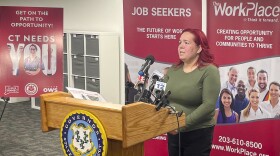http://cptv.vo.llnwd.net/o2/ypmwebcontent/Chion/hj%20110708%20urban%20miners%20feature.mp3
Green construction is a pretty familiar concept these days. But did you also know there’s a green way to remove a building? Instead of demolition, it’s called deconstruction, and one small Connecticut business hopes to grow it into an industry. WNPR’s Harriet Jones reports.
Back in the 1930s, the town of Hamden built itself a brand-new firehouse… some seven decades later, it’s no longer a firehouse, but it’s still here on Putnam Avenue, and I’m visiting its present owner, Frank Poole.
“I’m a commercial photographer and I have my photo studio here, which is the old garage where the trucks were. We did a lot of work to it, it was really a mess. I put an incredible amount of sweat equity into the building. Every guy’s dream is to have his own firehouse – well, I did it, and now I have it!”
When Poole first moved into the building six years ago, he found a surprise in the basement – he shows me an old photo that’s hanging in the hallway.
“So this is dated 1939. And you can see the bowling alleys sign is up – bowling alleys downstairs – and I guess it was for the firemen’s entertainment and people in the neighborhood. If you speak to anyone that grew up here during that time, everyone bowled here. Kids were pinsetters – you’ll see there are mechanical lanes when we go downstairs – and everybody has a memory of coming here and bowling.”
It’s part of the town’s history, but now, some of it has to go – Poole has to remove two of the bowling lanes because of a rot issue underneath.
“There were actually four lanes. Some water got in underneath one against the far wall, and there’s no other way to get in there and get that wood out. And then I met Joe and he’s finding a use for the alley wood, which is great – it’s beautiful wood.”
Joe is Joe DeRisi. He’s the founder of Urban Miners a deconstruction business based in Hamden.
“The guys are down here working as you can hear...”
He and his workers are removing the two old bowling lanes, carefully, piece by piece – because this isn’t junk – it’s very valuable.
“All of it is sold at this point, and I probably could use another couple hundred square feet of it, but I don’t have it. We sold some already to one of my customers who has a rental in downtown New Haven. She bought some cabinets from a 1960s house in New Haven that I had, and she made countertops out of the bowling alley for those cabinets. Someone else made two picnic benches out of them, and then an architect has actually designed with a customer a room that has a table made out of bowling alley and also the floor, wall and part of the ceiling, so apparently bowling alley is now a hot commodity.”
This what Urban Miners does – instead of demolishing structures, they take them apart, for re-use or recycling.
“We don’t encourage removing buildings, but if you have to do it, then you can save the building by taking all of its components and integrating them back into another building.”
A bowling alley in the basement of an old firehouse is a unique circumstance, but DeRisi says deconstruction can be used on any structure.
“In a typical house in New England, you can pretty much reuse everything. We can save the ceiling panels and the insulation, painted drywall, roof shingles recycled and made into new roads. The fixtures, the flooring, the framing material, foundations sometimes, trim, bathroom fixtures, can all be reused.”
He says the biggest challenge right now is to encourage a more robust market for used building materials. He’s also keen to develop a skilled workforce. When the town of Hamden recently proposed demolishing about 20 structurally unsound houses that had been built on a landfill, DeRisi came up with a proposal.
“If we deconstruct these instead of demolish them we could probably do it for the same cost or less. We’re going to produce a lot of materials and we can employ local people to do the work. So this could be a very positive thing instead of something that looks very negative.”
With a grant from the Workforce Alliance he’s used the project to develop a training course for eight local people who are currently unemployed. They’re completing 40 hours of theoretical coursework through Gateway Community College, and will then put their new skills to use deconstructing some of the condemned houses. Student Okon McCullough has been unemployed for two years.
“I used to be also a construction worker, you know, doing labor, helping the guys out with sheet rocking, taping and things of that nature. Now you didn’t get to the practical part yet, you’re looking forward to that – yes I am, I’m definitely looking forward to it.”
Eric Edwards is also on the course – he’s excited about his future prospects.
“I could see a lot of opportunity in this field of work, and it could produce some quality jobs for people who are looking for employment, because as we all know, finding a job is pretty tricky. There’s a lot of frustrated people out there – I know, because I’m one of them.”
DeRisi says he hopes to be able to employ some of the students himself if he can bid for more work at the site – the next step in building a homegrown deconstruction industry.
For WNPR, I'm Harriet Jones.









